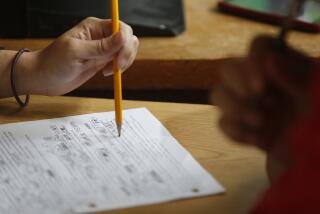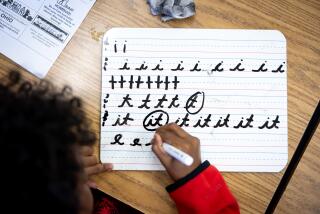Learning to Think--the Write Way : Key to Education Is Putting Words on Paper, Experts Say
- Share via
Ernest Boyer is president of the Carnegie Foundation for the Advancement of Teaching.
How can you tell, he was asked, whether a given high school is doing a good job? His answer: Have all the seniors write an essay on a subject of their choice and read them. That would tell you more about whether the school was succeeding in its basic mission than any other measure.
Thoughtful observers like Boyer increasingly agree that writing is necessary for genuine learning.
This shouldn’t surprise us. Think back over your own school or college experience. What do you remember best? Do any of those true-false tests really stand out in your mind? Do you remember anything about your textbooks except the graffiti on the covers?
Writing Was What Stuck
I took Psychology I just 20 years ago. I recall the appearance of the teacher and the layout of the room. I remember absolutely nothing about the exams (all machine-graded) or the textbook. But I remember the one report I had to do. I recall not just the subject (Jung’s theory of archetypes), but several of the examples and the basic conclusions.
I wrote a detailed outline for that report, and while I’ve lost most of the details, I’ve kept the framework. I read books just last year, and articles just last week, which I’ve forgotten almost completely. But I can remember the subjects of three or four book reports I wrote when I was a senior in high school.
(We’re not talking here about remembering what you like . To the best of my recollection, I liked nothing whatever about John Bunyan’s “Pilgrim’s Progress” when I was a senior in high school. But I had to write about it.)
Janet Emig of Rutgers University, who has studied the matter closely, concludes: “Writing represents a unique mode of learning--not merely valuable, not merely special, but unique.”
Learning to Think
The reason? John Dewey had it right: We learn what we do. When we write, we do several things. We think; we formulate our thoughts into meaningful strings of words, testing them in the process; we record those words graphically; we read them back to test them again.
When we write we not only think, recall, select and verbalize; we visually reinforce the verbal choices which we have physically recorded. Hence writing is unsurpassed as a way of learning to think and a way of thinking to learn.
The research, which confirms this conclusion in one way or another, would easily fill several editions of the Sunday Times with no room for ads. Those who care about students should take the issue of writing in our schools and colleges very seriously.
Bill Honig, California’s superintendent of public instruction, does. He says: “The habit of good writing--the organization of ideas, the marshaling of evidence, the proper choice of words--is virtually indistinguishable from clear thinking.”
Ernest Boyer, in his fine study of secondary education, “High School,” puts it this way: “Clear writing leads to clear thinking; clear thinking is the basis of clear writing. Perhaps more than any other form of communication, writing holds us responsible for our words and ultimately makes us more thoughtful human beings.”






